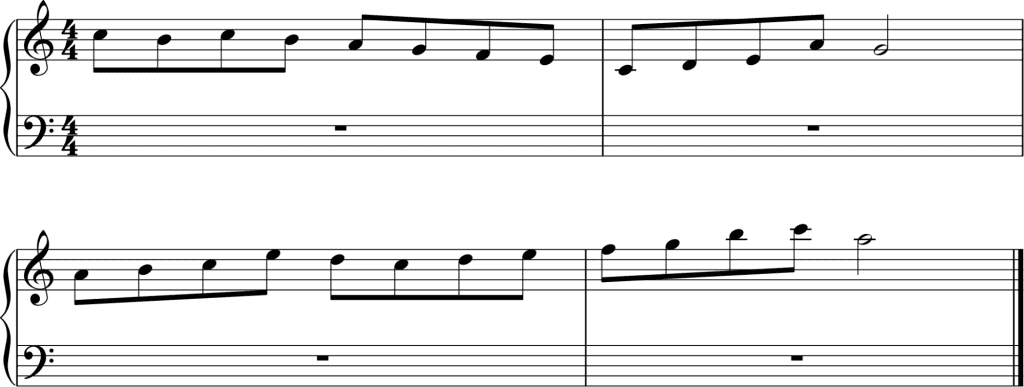Piano Blog by Skoove – Piano Practice Tips
You might think of music theory as a purely abstract concept. After all, isn’t theory reserved for the realm of intangible objects? What good is a theory in the real world? What benefit is there to learning music theory if it isn’t ever used in real music by real musicians?
You may be asking yourself all these questions and wondering why you should even bother with theory. However, the truth is learning piano theory, even just a little bit, will improve your playing in unimaginable ways! You will open new doors to your understanding of music and access creativity you never knew existed!
Piano theory helps you to read and interpret music faster
Piano music theory is essentially music theory applied to the piano. It is a tool musicians use to describe tendencies in music. If you learn how to speak the language of piano theory, you can use the patterns and structures in many creative ways.
If you tried to sound out every letter of every word of this article, it would take you forever to finish. Your comprehension would likely be poor and you would probably need to read this a few more times to really understand it.
Basic piano theory for beginners
Of course, you don’t read words like this. By learning how to read language, your mind learns to identify groups of letters and words so you don’t have to constantly think about every sound. The ability to recognize words and their context in a larger sense means you can grasp larger concepts easier and more deeply.
The same thing is true for music. By learning music theory concepts like triads and scales, you can learn to identify the common patterns that appear visually. This means that you won’t have to think so hard to spell out each individual note of a chord or scale, and can instead learn the music more quickly and have a greater understanding of what exactly is happening in the music.
For example, take a look at these two measures of music:
You could approach this in two ways. Without using piano music theory, you could sound out each note, write it down, and then practice it until you don’t need to think about it. With piano theory, you could zoom out, look at the big picture and see that in these two measures you are simply arpeggiating a C major triad, one of the most basic chords on piano.
Obviously, this is a basic example, but do you see how having some understanding of theory and how it relates to piano will increase your ability to read and interpret music?
Understanding theory will make you a more fluent player
Once you gain some piano theory skills, you will begin to see that most music is composed of basic patterns and structures. The biggest differences between songs are how these patterns and structures are combined together.
Understanding this concept will make you a more fluent and agile player and allow you to develop and manipulate the basic building blocks of music like a master of time and space! After all, music is just the organization of vibration, like the physicists have determined all matter is vibration.
If you take the time to study the major and minor scales, music will begin to make more sense and seem more like a cohesive, logical organism than a random string of notes connected in some mysterious and unknown way. Take these measures for example:
Once again, if you approach these measures without knowledge of piano theory, you would most likely be bogged down in sounding out the pitches and then need to practice for a while to be able to perform the notes successfully.
However, with knowledge of piano theory, you can again zoom out and see that the first 2 measures are moving in eighth notes around the C major scale, while the second 2 measures are moving in eighth notes around the A natural minor scale. Easy! All of a sudden, by incorporating a little piano theory, you have made yourself a more fluent and agile pianist.
Piano theory will help you to see the bigger picture
Once you dip your toes (or fingers) into the world of piano theory, you will likely become so curious that you will not want to stop. You will begin to see the larger structure of music and begin to make important connections between songs and musicians that you love.
For example, if you learn about the nature of key signatures, and combine that knowledge with your understanding of chords, you will unlock many hidden secrets of chord progressions. You will find that many songs follow the same chord progressions, or with subtle variation. Spending some time learning how piano chords fit into key signatures will help you to learn chord progressions faster and transfer them to different keys or tonalities with ease.
Of course, it will take a little mental effort to get these concepts under your fingers, but the rewards are certainly worth it. Here is a little example of the possible triads in the key of C major:
Using this knowledge, you can be almost 100% certain that any song in the key of C major will use some combination of these 7 chords. This knowledge helps narrow down the realm of possibilities and can be a guiding light in what can appear to be an endless sea of piano keys.
Learning music theory will increase your creativity
A common mistake among beginning students is to think that learning theory will somehow trap you or box in your creativity. The truth is, if you think you will be boxed in, then you are already boxed in.
Piano theory is simply a tool used to describe tendencies in music. By learning how to manipulate these tendencies, you can master their designs and patterns. The knowledge gained by doing this will allow you to exercise your own creativity with these tools and unlock you from any boxes you may be trapped in.
For example, by understanding how chords work on the piano, you can build more unique and interesting chord progressions. Chords are essentially any combination of two or more notes. There are basic chord patterns like the progressions of triads in C major we learned a moment ago, but there is an (almost) infinite amount of other possible chords. Learning piano theory will help you to identify, organize, and make use of these chords in creative situations. It is to your advantage to learn how to use these tools.
Piano theory helps you communicate with other musicians
Obviously, not all musicians know about or care to understand music theory. But, if you learn to understand the tools of music theory you will be able to communicate more clearly with other musicians. You will be able to accurately communicate things like chord changes, key centers or key changes, which scales to use when improvising or creating melodies, and any information about time signatures.
Understanding all of this will make you more valuable to a group of musicians and deepen your enjoyment of the creative process. So when you are next jamming with your friends and somebody asks you what are intervals, you will be able to answer and sound like you know what you are talking about!
Try out your free trial of Skoove today!
Conclusion
Piano theory is an extremely useful tool to learn as a beginning piano student. Don’t make the mistake of thinking it useless or constraining. Quite the opposite is true. Learning how to use piano music theory will allow you to read and interpret music more quickly, make a more fluent performer, allow you to view larger structures in music, enhance your creative music making, and help you to communicate about music more clearly with other musicians. All of these benefits make the study of piano theory well worth the efforts!
Author of this blog post

Eddie Bond is a multi-instrumentalist performer, composer, and music instructor currently based in Seattle, Washington USA. He has performed extensively in the US, Canada, Argentina, and China, released over 40 albums, and has over a decade experience working with music students of all ages and ability levels.
Read More
This article is from an external source and may contain external links not controlled by Empeda Music.




